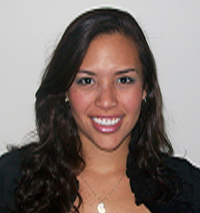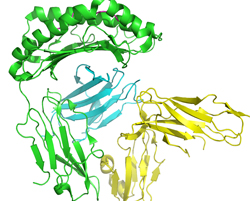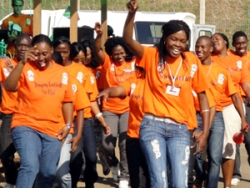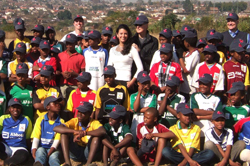Ragon Summer Student Program
For many, summer time means beaches and barbeques, but for motivated high school and undergraduate students interested in HIV research, summer also means research at the Ragon Institute.
The Ragon Institute Summer Student Program, directed by Dr. Sylvie Le Gall, has been in force since 2005 and has grown exponentially over the past five years. The program runs for 8-12 weeks from May to September and welcomes students from all over the United States from high school to graduate levels.
This year the Ragon Institute hosted 14 students. Some were linked from programs at Massachusetts General Hospital (MGH), Harvard Medical School (HMS), and Howard Hughes Medical Institute (HHMI) while others applied directly to the program.
Program Benefits
Summer students do not merely perform routine laboratory tasks, rather they are encouraged to get involved in the research.
Each student is assigned a faculty advisor, matched to them by their area of interest. A short-term project customized to the student’s experience level is designed by the faculty and supervisor. After receiving training specific to each project, new students perform experiments under supervision or, for experienced students, with more autonomy. They will generally learn to do several types of experiments to apply to a question. They write protocols and learn to read test results. At the end of their term, each student gives an oral and written presentation of their results.
Students also participate in weekly lunches where faculty members present their research and discuss their career paths. They also attend lab meetings and well as Institute-wide seminars. This year students also attended several evening immunology lectures given via DVD by Dr. Harris Goldstein, Director of the Einstein-Montefiore Center for AIDS Research and moderated by Dr. Le Gall.

“Being a student at the Ragon Institute has allowed me to learn about HIV and the immune system in an atmosphere where everyone is excited and truly believes in what they do.” – Edith Bracho-Sanchez
A Stepping Stone
For many of the 55 or so students who have participated, the Summer Student Program has been a stepping stone to greater opportunities in HIV research. Many have returned to the Ragon Institute for additional training during the school year or the following summer, or stayed on as research technicians before applying to graduate or medical school.
Edith Bracho-Sanchez is a graduate of the University of Florida, who is in her second year of the Ragon Summer Student Program. She says, “I have received nothing but excellent mentorship and, as I apply to medical school, I have felt the support and encouragement of my entire lab.”
Several local students have written undergraduate theses, based on their summer work and additional training, some have been awarded prizes by Harvard University. Two HHMI Exceptional Research Opportunities Program (EXROP) students obtained prestigious Gilliam Ph.D. Fellowships sponsored by HHMI. One former participant in the program was awarded a Fulbright Fellowship in 2009 to go to Edendale Hospital in Durban, South Africa to work with Dr. Krista Dong and is currently a 2010 Rhodes Scholar at Oxford University, studying social policy.
Participating students and instructors agree that the greatest achievements of the Summer Student Program is inspiring the next generation of scientists by fostering a long-lasting interest in research, medicine and HIV/AIDS.
“I agreed to become a mentor because I feel education is part of my job as a scientist,” says faculty mentor Dr. Daniel Kavanagh. “What I discovered is that the students in my lab were remarkably productive, and the teaching and learning was bidirectional. The summer students really became contributing members of the lab and it was a great experience.”
The Ragon Institute provides training to students of all levels. Visit Ragon Institute Education for more information.

Focus on: Yu Lab
What was intended to be a 6-month training program has turned into more than 10 years of fruitful scientific investigation for Dr. Xu Yu.
Dr. Yu received her medical training in her native China at the University of Shenyang. During her training as an MD and her internship as a physician in internal medicine, she became interested in HIV infection and decided to join an HIV research lab which investigated immune responses to HIV in Chinese patients. In 2000, she came to Dr. Bruce Walker’s lab at the Partners AIDS Research Center (PARC, now the Ragon Institute) at Massachusetts General Hospital (MGH) for a 6-month program of training and research experience. Ten years later, she is an independent faculty member at the Ragon Institute with a thriving lab of her own.

Doctors Xu Yu, Bruce Walker, Todd Allen and Marcus Alfteld in 2002.
Initial Research Lays the Groundwork
Dr. Yu’s work in Dr. Walker’s Lab initially focused on identifying the components of HIV that T cells can most effectively attack. These depend in part on the genetic background on the persons, in particular the HLA class I alleles. Such genetic characteristics vary significantly between persons of different ethnicity, and one of the challenges of developing a broadly-applicable HIV vaccine at that time was to identify common parts of the HIV virus that can be recognized by T cells from individuals with different genetic backgrounds.
As part of these investigations, Dr. Yu became a key player in a large, trans-continental study that investigated T cell immune responses against HIV-1 in persons from China, Thailand and Latin America. In these studies, Dr. Yu actively transferred newly-developed technologies for the characterization of HIV-1 T cell responses to Chinese research centers. Until today, Dr. Yu keeps close connections with Chinese investigators and works on scientific advisory boards for the Chinese National Grand Program on Key Infectious Diseases.
When transitioning to an independent position, Dr. Yu decided to focus on how T cell receptors can recognize HIV-1 T cell epitopes. It was well recognized at this time that millions and millions of different T cell receptor sequences are available in each person, but which one of these can recognize HIV and how the recruitment of specific T cell receptor sequence clusters can shape HIV-1 evolution was unknown.
Dr. Yu was the first one to show that some HIV-1 T cell epitopes can only be recognized by a very narrow number of TCR sequences, and that these sequences tend to be highly conserved among different persons. Most surprisingly, Dr. Yu found that such “public TCR” sequences appeared to occur most frequently in persons who express HLA-B57 and experience a milder course of HIV infection.
The Yu Lab is now using new deep sequencing technologies that allow for analyzing TCR sequences at a much higher resolution and is collaborating with investigators from South Africa to determine how TCR recruitment shapes HIV-1 immune responses during the early stage of the infection.

Crystal structure of the interaction between leukocyte immunoglobulin like receptor B1 (LILRB1, ILT2) and HLA-A2 molecule (provided by Dr. Eric Sundberg) (green=HLA-A2, cyan=Beta2m, magenta=peptide, yellow=ILT2)
Dendritic Cell Based Research
A second major focus of the Yu Lab is the investigation of dendritic cells during HIV-1 infection. These cells are comparable to the generals in the army of different immune defense mechanisms and determine how effectively T and B cell immune responses against HIV-1 can be mounted.
Her work in this area started when she and her collaborator Dr. Mathias Lichterfeld first recognized that HIV-1 tetramers, the reagents that had thus far been used for identification of HIV-1-specific CD8 T cells, also bind to regulatory receptors on dendritic cells. In other words, Dr. Yu found that HIV peptides presented by MHC class I complexes can modulate the functional activity of dendritic cells by interacting with surface receptors that govern the functional characteristics of these cells.
Even more importantly, Dr. Yu’s lab also showed that escape mutations in such HIV-1 peptides can increase the binding to such MHC class I complexes to inhibitor receptors, which means that HIV-1 uses a sequence-specific mechanisms to reduce and block the immune activity of dendritic cells.
This work, for which Dr. Yu recently received the prestigious Krane Award for Excellence in Research from the Department of Medicine at MGH, has changed the perception of the biological consequences of HIV-1 sequence diversification. Dr. Yu believes that such immunoregulatory effects of HIV-1 CTL escape mutations need to be considered when designing HIV-1 vaccine sequences.
The Role of Technology
A key component of the Ragon mission is “creating non-traditional partnerships among experts with different but complementary backgrounds”. Therefore, when PARC became the Ragon Institute in 2008, Dr. Yu saw the potential for synergizing with other investigators to develop novel approaches to answering questions for which no appropriate technical solutions existed as the time.
How do you detect HIV-1 infected cells in patients receiving antiretroviral treatment? Medication is extremely effective in reducing HIV-1 replication but it is now well recognized that HIV-1 persists despite this therapy and rapidly rebounds when such drugs are stopped. Therefore, a major question is: Where is HIV-1 hiding during treatment with antiretroviral agents? And why can HIV medication not completely eliminate the virus?
For this question, Dr. Yu approached Dr. Chris Love, MIT Assistant Professor and new Ragon collaborator, who works on combining ideas from materials science and chemistry to develop new micro- and nanotechnologies to study the biology of cells. Dr. Yu saw the opportunity to use this technology to isolate and identify the HIV-infected cells from patients receiving antiretroviral drugs.
Drs. Yu and Love were able to obtain seed funding from the Harvard Catalyst Program, and with these start-up funds, they were able to make significant progress to obtain competitive R01 funding to advance the project.
Dr. Yu feels that this is a great example for how complementary experiences in a specific area can fundamentally change research perspectives, and how the Ragon Institute can catalyze such developments through collaborations that transcend classical and traditional boundaries between academic departments.
She notes that the leveraging of technology requires a time investment. “It’s easy to quickly dismiss a new technology as not well developed,” she says. “But if you stay committed, you may be able to open an entirely new perspective”
Looking back and forward
Looking back on her time in Boston and at the Ragon Institute, Dr. Yu is gratified to have fulfilled her promise to give back to China. She is also grateful for being able to work with so many talented and motivated individuals who all have a common goal of finding an effective immune defense mechanism against HIV-1.
She makes special note that her work would be impossible without the team of post docs and Ph.D. students she has gathered in her research group, in particular Jinghe Huang, Yue Yang and Chun Li. “They are putting their hearts and souls into their experimental work and recognize the great responsibility that comes with their job” she says. Dr. Yu feels that by mentoring them, she can give back some of the great support she has received during her career. Indeed, Dr. Yu feels that seeing people from her group rising from junior postdocs to critical and creative investigators with independent minds is one of the most rewarding aspects of her job.
Dr. Yu particularly enjoys the new collaborations that have grown out of the establishment of the Ragon Institute. She says, “Without the connections made here [at Ragon], we wouldn’t know what is possible.”

The focus of the Ragon Institute is the collaborative development of an effective HIV vaccine but with new infection rates in many parts of the world remaining staggeringly high and a vaccine still years away, there is an urgent need for programs to prevent infections, especially in teenagers who are most at risk. The following is a shining example of one such program with which Ragon Institute investigators are collaborating.
WhizzKids United: From HIV Vaccine Development to Soccer
For many sports fans, this year’s World Cup in South Africa was the highlight of the year. But for WhizzKids United (WKU), the World Cup served to shine a light on this important program operating in the heart of the AIDS epidemic in South Africa.
WKU is a unique youth training program which uses soccer (football) as a vehicle to teach South African children life skills, a prime component of which is how to stay safe from HIV infection. WKU CEO, Marcus McGilvray observes, “Children with strong motivators who want to achieve their goals are far less likely to get HIV.” WhizzKids United endeavors to assist South African children to develop those motivators.
The WhizzKids Curriculum
The WKU program was developed by McGilvray while he was working with Ragon Institute investigators in the early stages leading up to the rollout of HIV treatment programs in South Africa in 2003.
“We hired Marcus as a nurse to help train other nurses and lay counselors in the use of these new medications that were finally being introduced,” said Ragon Institute Director, Dr. Bruce Walker. “Marcus took the job on the condition that he could continue to work with street children on Friday afternoons, and developed one of the most impressive HIV prevention programs I have ever seen.”
The 16-hour program endeavors to get to the root of heath and social issues. For example, the health portion of the curriculum encourages “self-efficacy”, enforcing the idea that one can have control over one’s own health as well as understanding the social issues surrounding sex.
The personal and social development sections encourage children to become goal-oriented, long-term thinkers who are motivated and hopeful for their future. Practical advice is offered on how to deal with peer pressure, how to recognize and avoid dangerous situations, and how to work as part of a team.
All of this is done around a theme of soccer, using soccer as an analogy for life. “If you want to succeed at football, you have to choose your teammates wisely. If you play soccer without the goals, it is a very different game, and the same applies to life” says McGilvray.
At the end of the football training program, one boy and one girl from each class who have demonstrated exceptional leadership are trained as Peer Educators. These children conduct their own Peer Education curriculum, thereby reinforcing the life skills lessons from within the peer group. Peer Educators also serve as an approachable front-line source of help for troubled youth who might be too intimidated to go to an authority figure.

Demonstration of the Diski Dance at the opening of the WKU Health Academy
WKUHeath Academy
Besides the excitement surrounding the World Cup, this summer the WKU program hit another milestone in its growth with the opening of the WKU Health Academy at Edendale.
This center, the first of its kind in South Africa, is designed to provide HIV counseling, testing, and treatment, psychosocial support, family planning, STD treatment and management programs as well as programs specifically tailored to support and care for orphans and vulnerable children. Football leagues, computer training, and homework clubs are designed to encourage youth to attend one-on-one counseling and risk assessment every three months. Says McGilvary, “We’re basically taking young kids by the hand and walking them through the most difficult period of their lives – adolescence.”
International Attention
The program has been steadily gaining international attention. This March, WKU received the Best Global Sports for Health Program award from Global Sports Forum Barcelona. And Wilfried Lemke, the UN Secretary-General’s Special Adviser on Sport for Development and Peace, praised WKU for its “strong example of the power of football for development.”
John Henry, Boston Red Sox owner and MGH Trustee, traveled to South Africa with his wife Linda last year and observed a program session. “Using sports to save children’s lives is a remarkable accomplishment,” he says. “It was amazing to see how well they integrated serious learning with fun, and how it motivated the children. Every child could benefit from participating in this program”

Boston Red Sox owner and MGH Trustee John Henry and his wife Linda visiting the WhizzKids Program in South Africa in 2009
Program Expansion
The WKU center and program continues to expand both in physical space and in reach. Recently, Fédération Internationale de Football Association (FIFA) awarded funds to build a Football for Hope Centre as an extension of the WKU Heath Academy which is already seeing the need to augment their four counseling rooms. Funds have also been secured to build two research rooms and a football pitch.
Additionally, the Minister for Health of Swaziland and the World Health Organization (WHO) intend to roll out a country-wide WKU program in Swaziland to target HIV and TB through soccer.
Securing funding is a continual challenge but long term support is essential in order to manage existing programs and further the WKU reach.
“South Africa is a wealth of talent,” observes McGilvary. And the WKU program is at the forefront of the effort to aid the next generation of South Africans to tap into that talent.


 Ragon Institute
Ragon Institute 